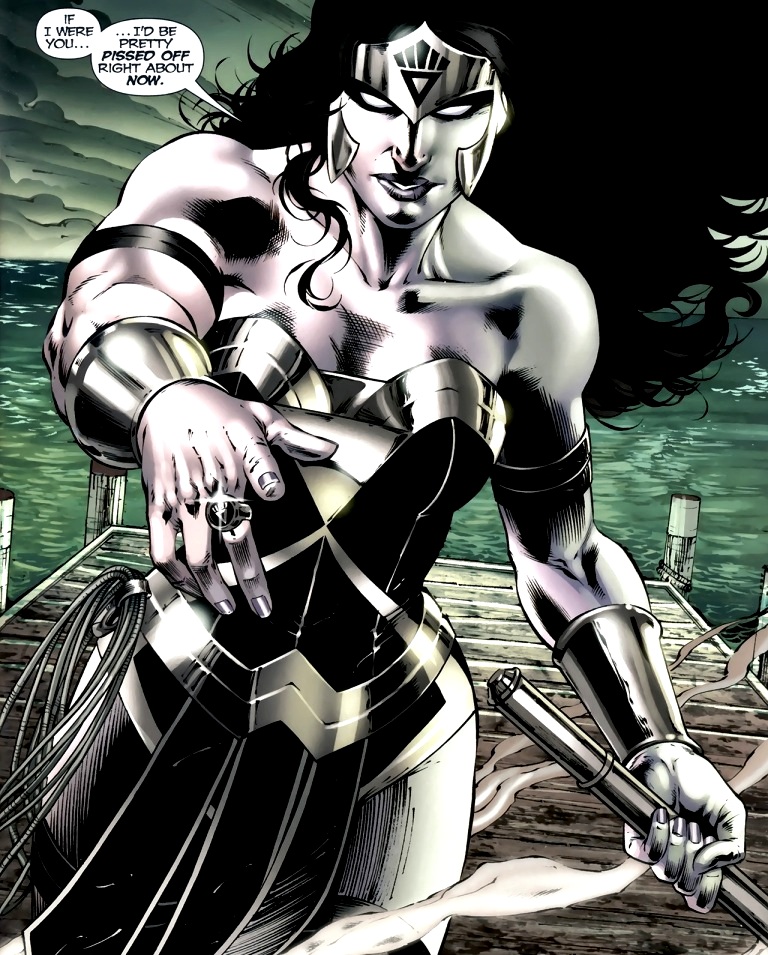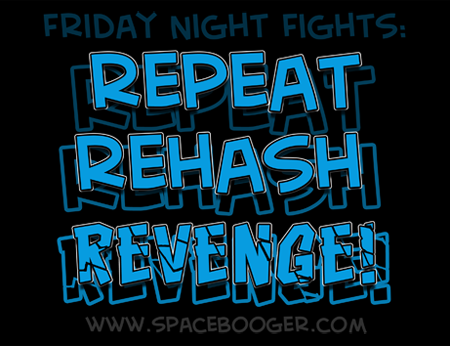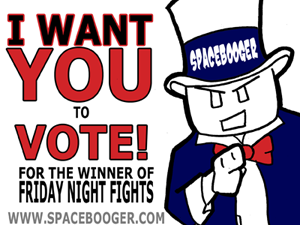The 500-Pound Super-Intelligent Gorilla In The Room
Conventional wisdom states that when someone from a marginalized group expresses concerns about their race's treatment or portrayals to a person in a non-marginalized group, the best move for said non-marginalized person (i.e. me) is to just shut up for a moment, step back, listen to what the other person has to say, and fully weigh what they're telling you. That's extremely wise advice.
I'm about to do precisely that now, so please bear with me.
Recently, DC released their "World Of Flashpoint" map, which drew harsh but justifiable criticism from comics blogs everywhere, including mine, for its jaw-dropping racial tone-deafness in labelling Africa as "Ape-Controlled".
2) The unimaginative use of Africa. Flashpoint is supposed to "change everything":
- Thomas Wayne the Batman
- Wonder Woman a crazed leader whose troops are rumored to deball any male who comes on her territory
- Captain Cold a hero
And Grodd a leader in Africa.
Grodd = Australia, now that would have a similar change in Status quo.
But Son of Baldwin takes things even further. Here were some summarized thoughts from him (also multiple comments combined):
Says who, what? That DC didn't have a single black superhero at the time it created a city of talking simians in Africa or that at the time that DC created Gorilla City, one of the prevailing racist stereotypes was depicting black people, ESPECIALLY those on the African continent, as apes?
Both of those are verifiable historical matters. Take a course on race in America or comb DC's archives. The information is available if you look.
Marvel is no saint, but in the Marvel Universe, the greatest place in Africa is Wakanda, a nation of civilized, technologically advanced African PEOPLE.
In the DC Universe, the greatest place in Africa is Gorilla City, a nation of civilized, technologically advanced African GORILLAS.
But what about the continent's greatest superhero, Vixen? Surely her people are something special. Nope. Just your average superstitious savages who live in huts--at least, that's how they were depicted in her recent mini-series.
I don't know about you, but that's a very revealing comparison to me.
And this is where I have to get off the train.
Sue has a good point about the lack of imagination in many aspects of Flashpoint. While Johns can be a good writer at times, he often displays all the creativity and originality of a Xerox machine, which is a real liability if your job title is "Chief Creative Officer". In terms of imagination, he's no Grant Morrison, Jack Kirby, or even Bob Haney. (Did we really need "Amazons Attack Redux - Now With More Castration", Geoff?)
But where Sue and I part company is where she thinks Grodd controlling the entire African continent is an insufficient change compared to the other changes she mentioned. Let me point out some of the elements in her examples above which also didn't change:
Batman - Still a Wayne, still in Gotham.
Diana - Still an Amazon from an all-female civilization.
Aquaman - Still a water-breathing Atlantean.
Captain Cold - Still shady and brutally violent, as his freezing of Piper's throat attests.
Also, allow me to compare Grodd's status quo in "Flashpoint" to that of another villain, Lex Luthor, back during the "President Lex" period a few years back. Whereas Grodd had controlled Gorilla City on-and-off throughout Flash history, the Post-Crisis Lex Luthor exercised great power over the city of Metropolis during his on-and-off time as the CEO of Lexcorp. But in 2000, Lex ran for and won the U.S. presidency in the DCU. To me, that represented a significant (albeit temporary) change in the status quo. However, if I used the same argument Sue applied to Grodd for Lex, it wouldn't be a significant change because Lex Luthor = United States.
Which brings me to Baldwin's contention that Gorilla City's very existence is racist. I can't get behind that conclusion, but I can empathize with the thought process he must have used in arriving at it. I even wrote about it. Essentially, without a sufficient counterweight in the form of fully-realized black heroes and supporting characters in comics (or any other medium, for that matter), any affronts or perceived affronts can seem much heavier.
And, make no mistake about it, DC in particular had no such "counterweights" in the Silver Age. Baldwin's correct: DC didn't have any black heroes until the early 70's. It definitely didn't have any at the time John Broome, Carmine Infantino, and Julius Schwartz created Gorilla City. Even now, the number of black heroes and supporting characters in total, let alone centered in Africa, is severely lacking at DC.
Baldwin's also right about the prevailing racist stereotype of depicting black people as apes, and even how black characters were drawn similar to apes in earlier decades prior to the Silver Age (by virtually everyone, not just DC). A recent trip to the Lincoln Museum reminded me that these depictions were prevalent in drawings for hundreds of years.
I'll even spot some things Baldwin didn't mention. Last August, I got the chance to meet former Legion of Super-Heroes artist Mike Grell face to face at the Chicago ComiCon. We had some laughs about the costume of Tyroc, the first black Legionnaire, and how he designed it as silly as he could. Prior to meeting him, I had read some articles explaining why Grell did that: in protest of the racism behind the creation of the character, particularly Tyroc's racial separatist origins. I'd also read how Grell and writer Jim Shooter had intended the character of Soljer in the story "Soljer's Private War" to be a black man, but that editor Murray Boltinoff had ordered the character colored pink (Caucasian). I'd also read how, many years before that, Shooter had intended Shadow Lass to be the first black Legionnaire, only to have that nixed in favor of giving her blue skin.
Oh, and did I mention the same Broome and Schwartz who gave us Gorilla City also gave Hal Jordan's Eskimo sidekick Tom Kalmaku the nickname Pieface?
So you see, with all the info I've presented above, how DC doesn't exactly deserve the benefit of the doubt here. However, that doesn't necessarily mean they're actually guilty in the case of Gorilla City in particular or Silver Age intelligent gorillas in general. Simians had become particularly popular as the result of films like King Kong and Mighty Joe Young. In fact, the Kong movie was remade in 1962. (The trend of talking animals in general was also popular with films like Dr. Dolittle and TV shows like Mr. Ed.) It makes sense that Silver Age comics might choose to cash in on this trend, even without any racial biases. Plus, while it's true about the stereotyping of dark-skinned people as talking simians, two things make me doubt this was the intent with the Silver Age talking gorillas. First, DC's Silver Age artists, including the aforementioned Mr. Infantino, drew them very distinct and ape-like. Second, these talking simians were always depicted at least as intelligent as the humans around them; in most cases, they were far more intelligent. Plus, as in the case of Gorilla City, their civilizations were much more advanced. If racism were the intent wouldn't the opposite have been true?
Most importantly, though, there's the one key fact I can't get past. The real reason why the argument that Gorilla City and Grodd's conquest of Africa is racist just completely falls apart for me:
Gorillas are native to Africa.
That's why Gorilla City is located in Africa: because Africa is gorillas' native habitat in real life. The question I've heard is "why couldn't they just have Grodd take over another continent, like Australia?". My question is: Why would he? Wouldn't a would-be conqueror like Grodd start by taking over his own home turf first to establish a beachhead and then expand outward? The only reason I can see for not doing that is a strong resistance in his own land (i.e. Superman in Metropolis or Prince T'Challa in Marvel's Africa), and, as Baldwin points out, DCU lacks such strong figures or teams in Africa.
The next question might be "But if Professor Zoom can make Batman Thomas Wayne, why can't he move Gorilla City or even gorillas in general to, say, Australia?" Again, the question is "Why would he?" Based on what I've seen so far, Zoom's done a lot of playing around with the people, but he's kept the geography fairly intact. The other cities we've seen have appeared to stay in the same location. Coast City, for one thing, is exactly where it was pre-Flashpoint. (See the latest Booster Gold issue as proof.) . So I can't see why Gorilla City would be the exception.
Whatever weaknesses Johns has in terms of imagination, I can't fault him on internal logic or consistency here.
I'll admit: I've got no special line on the general consensus of African-Americans, or any other group, on any subject. But I have to guess it's not necessarily unanimous on Grodd, seeing how the late Dwayne McDuffie saw fit to give him a prominent role in the Justice League Unlimited cartoon he oversaw.













/cover-large.jpg)



























